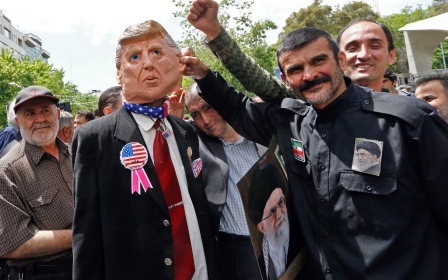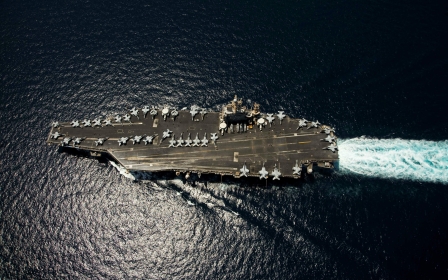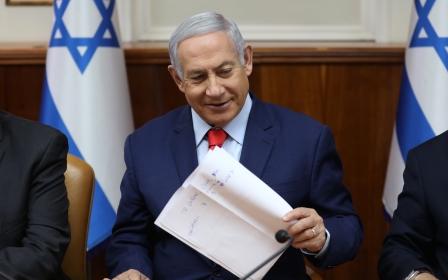Iranian press review: Women riding bikes and men preparing for war

Rouhani asks for additional powers ‘in times of war’
Iranian President Hassan Rouhani has not missed an opportunity in recent days to reiterate his calls for changes to Iran’s political structure to increase presidential powers amid what he describes as an “economic war” waged by the United States against Iran.
On Saturday, Rouhani told reporters that Iran’s president enjoyed sufficient powers to lead the country in normal circumstances, but that “the situation is different in times of war”, Iran daily reported.
Rouhani compared Iran’s current situation under US sanctions to what Iranians experienced during the eight-year war with Iraq in the 1980s. Throughout that war, the founder of the Islamic Republic, Ayatollah Ruhollah Khomeini, handed extra powers to then-President Ayatollah Ali Khamenei to lead the country during armed conflict.
Rouhani said he had spoken with Khamenei, now Iran’s supreme leader, to tell him the country “now faces a war” and needs a commander.
New MEE newsletter: Jerusalem Dispatch
Sign up to get the latest insights and analysis on Israel-Palestine, alongside Turkey Unpacked and other MEE newsletters
While Rouhani claimed Khamenei has ordered him to command this war, the president’s demands for more power have been strongly rejected by hardliners in Iran.
Ayatollah Ahmad Alamolhoda, a conservative cleric, reminded Rouhani in an Instagram post of the fate of Abolhassan Banisadr, the Islamic Republic’s first president.
Banisadr had also asked for broader presidential powers, but was impeached after 16 months in power and escaped to Paris.
Iran searches for its stolen treasures
Iran has been struggling for decades to recover stolen artefacts from Western museums and collections, Shahrvand daily detailed on 23 May, in an interview with the director of museums and historical properties at Iran’s cultural heritage organisation.
Since the early 1940s, Mohammadreza Kargar told Shahrvand, Iran has had official programmes to bring back its ancient relics.
However, Kargar said the Iranian programmes only have information about objects listed in museum catalogues or in books - leaving numerous items held in museum storage unaccounted for.
In October, an ancient limestone relief depicting an Achaemenid soldier was returned to Iran after a New York court ruling - a rare victory for Iranian efforts to reclaim antiquities from abroad.
The relief in question was found and taken by Western archaeologists in the late nineteenth or early twentieth century - back then Iran was a battleground for British and French archaeologists.
In recent years, lack of regulations over illegal excavations and ineffective laws prohibiting trade of antiquities have led smugglers to expand their activities in Iran.
Inflation rate reaches 34 percent
The Statistical Center of Iran has revealed that the rate of inflation for the last 12 months has reached 34.2 percent.
This marks a sharp rise since May 2018 - the country’s inflation rate was 18 percent - when the United States unilaterally left the international nuclear deal with Iran and reimposed sanctions on the banking system, oil exports, and money transfer to and from the country.
Meanwhile, officials at the International Monetary Fund (IMF) have predicted that inflation will reach up to 40 percent in Iran and the country’s economy will shrink by 6 percent in 2019 because of the American sanctions.
Poverty levels have also increased in the country. A report by the Hamdely daily, based on data from the Iranian parliament’s research centre, estimates that 40 percent of Iranian families live below the poverty line.
Debate rages on over women cyclists
Women’s right to ride bicycles in public has been pushed to the forefront of public debate in Iran after a representative of Khamenei in the city of Isfahan asked the judiciary system to act against female cyclists.
The request was rejected, with a spokesperson for the Iranian justice system saying: “No legal ban does exist against women’s cycling.”
On Sunday, Iranian legislator Mohammad Kazemi took to parliament to criticise hardliners and religious figures, who have been proposing preemptive measures to prevent women from biking.
“It is not acceptable to put obstacles in the way of women cyclists,” he stressed in his speech, reported by Iranian parliamentary news agency ICANA.
On 22 May, the front page of Etemad daily was covered by a photograph of Iranian female cyclists, along with the headline “Free to Cycle”.
Iranians have also taken to social media to denounce the hardliner push for a ban.
Iranian reformist politician Azar Mansouri posted a video on Twitter of women riding bicycles in the historical heart of Isfahan, asking “which halal [religiously allowed precept] of God becomes haram [forbidden]” if women ride bicycles.
* Iranian press review is a digest of reports that are not independently verified as accurate by Middle East Eye.
Middle East Eye delivers independent and unrivalled coverage and analysis of the Middle East, North Africa and beyond. To learn more about republishing this content and the associated fees, please fill out this form. More about MEE can be found here.




